
Anatoly Yevgenyevich Karpov is a Russian and former Soviet chess grandmaster, former World Chess Champion, and politician. He was the 12th World Chess Champion from 1975 to 1985, a three-time FIDE World Champion, twice World Chess champion as a member of the USSR team, and a six-time winner of Chess Olympiads as a member of the USSR team. The International Association of Chess Press awarded him nine Chess Oscars.
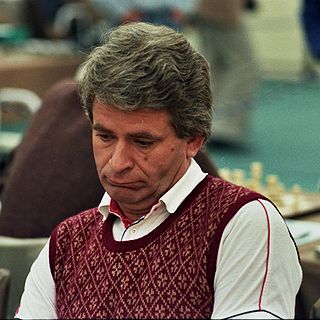
Boris Vasilievich Spassky is a Russian and former Soviet chess grandmaster who was the tenth World Chess Champion, holding the title from 1969 to 1972. Spassky played three world championship matches: he lost to Tigran Petrosian in 1966; defeated Petrosian in 1969 to become world champion; then lost to Bobby Fischer in a famous match in 1972.

Raymond Dennis Keene is an English chess grandmaster, a FIDE International Arbiter, a chess organiser, and a journalist and author. He won the British Chess Championship in 1971 and was the first player from England to earn a Grandmaster norm, in 1974. In 1976, he became the second Englishman to be awarded the Grandmaster title, and he was the second British chess player to beat an incumbent World Chess Champion. He represented England in eight Chess Olympiads.

Jørgen Bent Larsen was a Danish chess grandmaster and author. Known for his imaginative and unorthodox style of play, he was the second-strongest non-Soviet player, behind only Bobby Fischer, for much of the 1960s and 1970s. He is considered to be the strongest player born in Denmark and the strongest from Scandinavia until the emergence of Magnus Carlsen.

John Denis Martin Nunn is an English chess grandmaster, a three-time world champion in chess problem solving, a chess writer and publisher, and a mathematician. He is one of England's strongest chess players and was formerly in the world's top ten.
The Modern Defense is a hypermodern chess opening in which Black allows White to occupy the center with pawns on d4 and e4, then proceeds to attack and undermine this "ideal" center without attempting to occupy it.

Wolfgang Unzicker was one of the strongest German chess Grandmasters from 1945 to about 1970. He decided against making chess his profession, choosing law instead. Unzicker was at times the world's strongest amateur chess player, and World Champion Anatoly Karpov called him the "world champion of amateurs".

Ulf Andersson is a leading Swedish chess player. FIDE awarded him the International Master title in 1970 and the Grandmaster title in 1972.
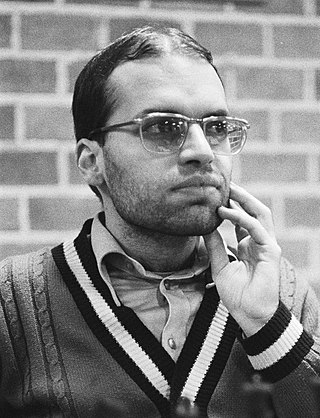
Henrique Costa Mecking, also known as Mequinho, is a Brazilian chess grandmaster who reached his zenith in the 1970s and is still one of the strongest players in Brazil. He was a chess prodigy, drawing comparisons to Bobby Fischer, although he did not achieve the International Grandmaster title until 1972. He won the Interzonals of Petropolis 1973 and Manila 1976. His highest FIDE rating is 2635, achieved in 1977, when he was ranked number four in the world. He became the third-best player in the world in 1977, behind only World Champion Anatoly Karpov and Viktor Korchnoi.

Robert Eugene Byrne was an American chess player and chess author who held the FIDE title of Grandmaster (GM). He won the U.S. Championship in 1972, and was a World Chess Championship Candidate in 1974. Byrne represented the United States nine times in Chess Olympiads from 1952 to 1976 and won seven medals. He was the chess columnist from 1972 to 2006 for The New York Times, which ran his final column on November 12, 2006. Byrne worked as a university professor for many years, before becoming a chess professional in the early 1970s.
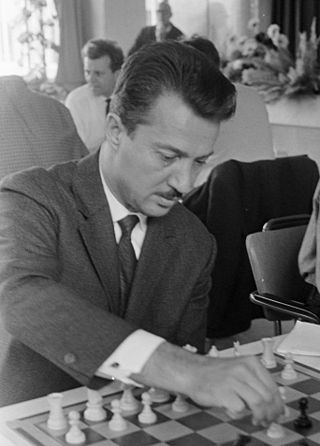
Svetozar Gligorić was a Serbian and Yugoslav chess grandmaster and musician. He won the championship of Yugoslavia a record 11 times, and is considered the best player ever from Serbia and Yugoslavia. In 1958, he was declared the best athlete of Yugoslavia.
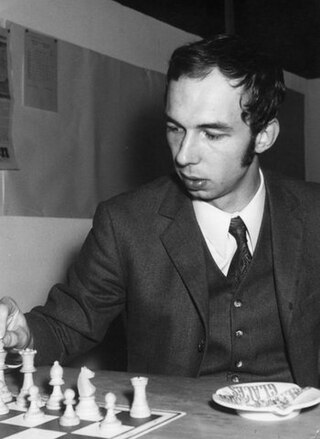
Lubomir (Lubosh) Kavalek was a Czech-American chess player. He was awarded both the International Master and International Grandmaster titles by FIDE in 1965. He won two Czechoslovak and three U.S. championships, and was ranked as the world's No. 10 player in 1974. He was inducted into the U.S. Chess Hall of Fame in 2001. Kavalek was also a chess coach, organizer, teacher, commentator, author and award-winning columnist.
In chess, a blunder is a critically bad mistake that severely worsens the player's position by allowing a loss of material, checkmate, or anything similar. It is usually caused by some tactical oversight, whether due to time trouble, overconfidence, or carelessness. Although blunders are most common in beginner games, all human players make them, even at the world championship level. Creating opportunities for the opponent to blunder is an important skill in over-the-board chess.
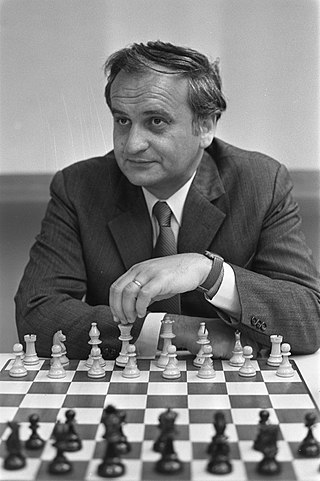
Borislav Ivkov was a Serbian chess Grandmaster. He was a World championship candidate in 1965, and played in four more Interzonal tournaments, in 1967, 1970, 1973, and 1979.

Hans-Joachim Hecht is a German chess player and twice the West German national champion. His first name is often abbreviated to Hajo.
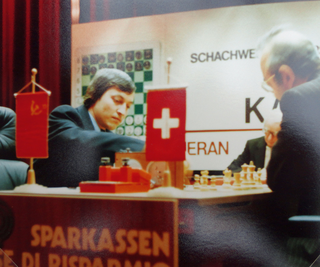
The 1981 World Chess Championship was played between Anatoly Karpov and Viktor Korchnoi in Merano, Italy from October 1 to November 19, 1981. Karpov won with six wins against two, with 10 draws. The two players had already played against each other in the World Chess Championship match 1978 in the Philippines, when Karpov also won.

Viktor Lvovich Korchnoi was a Soviet and Swiss chess grandmaster (GM) and chess writer. He is considered one of the strongest players never to have become World Chess Champion.
















